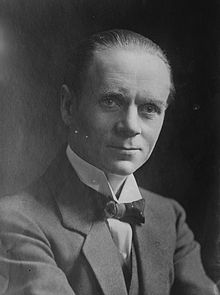Idealism (International Relations)
In the political science sub-discipline International Relations (IB), the theoretical mainstream that emerged before the First World War and dominated the IB in the interwar period until it was supplanted by realism after the failure of the League of Nations is referred to as idealism . The idealism in international relations is also synonymous liberalism in international relations called. The idealism based on the assumption that anarchy in international relations was einzuhegen through negotiations, agreements and supranational organizations.
Basic statements of idealism in the IB
The Idealimus is inspired by the belief in progress. He relies on the human gift of reason, which means that people are accessible to rational arguments and capable of learning. Accordingly, the principle of reason must lead to a better world in which every conflict and conflict of interests can be resolved in a cooperative manner through compromise and settlement. Eternal peace, the prosperity of all nations, worldwide democracy, the protection of universal human rights, the protection of the environment and other idealistic goals are in principle achievable. Central assumptions and prerequisites are self-regulating societies and a functioning legal system .
Development of idealism in the IB
Ulrich Menzel differentiates between idealism as a pacifist movement that has fought against an impending outbreak of war since the turn of the century, idealism , which was the ruling paradigm of the IB from 1920 until the end of the Roosevelt era in the mid-1940s , and liberalism as an influencing factor for the international one Politics in the interwar period, which led to the creation of the League of Nations and the Appeasement Policy .

A prominent representative of idealism and at the same time a pacifist idealist was Norman Angell , who achieved great publicity with his major work The Great Illussion from 1910 , which was published many times . According to Menzel, Woodrow Wilson's 14-point program from 1918, the founding of the International Labor Organization (ILO) in 1919 and the founding of the League of Nations in 1920 were decisive for the establishment of idealism . According to Menzel, the founding of the League of Nations and the ILO can be described as Interpret the intention to immunize the non-communist left against the October Revolution, i.e. as a counter-model to the Third International .
The term idealimsus was coined with disparaging polemical intent by the representatives of a rival school of thought in the IB, the realists , and has remained as a term in textbooks to this day. Realism in the IB reacted to the idealistic challenge in the crisis-ridden 1930s against the background of the failure of the League of Nations and the rise of fascism and the Soviet Union , criticized the lack of power in the school of thought and finally prevailed as the dominant current of the IB . Xuewu Gu notes that the idealists turned out to be losers in the first major scientific debate in the teaching of international relations .
In world politics, the change in the American presidency from Franklin D. Roosevelt to Harry S. Truman ushered in the realistic phase, which found its first programmatic expression with the Truman Doctrine to contain the Soviet Union in 1947.
literature
- Jens Steffek, Leonie Holthaus (ed.): Beyond the anarchy. World order drafts in the early 20th century . Campus-Verlag, Frankfurt am Main / New York 2014, ISBN 978-3-593-50087-4 .
- Ulrich Menzel : Between idealism and realism. The doctrine of international relations. Suhrkamp, Frankfurt am Main 2001, ISBN 3-518-12224-X .
Individual evidence
- ↑ Since it is a sub-discipline of political science , international relations is an independent term and is capitalized. The political science research object of the same name, international relations , is written in lower case. In addition: Siegfried Schieder and Manuela Spindler: Theories of international relations . 3rd edition, Budrich, Opladen 2010, ISBN 978-3-8252-2315-1 , introduction, p. 9, note 1.
- ↑ Ulrich Menzel: Between idealism and realism. The doctrine of international relations. Suhrkamp, Frankfurt am Main 2001, ISBN 3-518-12224-X , p. 21.
- ↑ Tobias ten Brink : State Conflicts , Lucius & Lucius (UTB), Stuttgart 2008, ISBN 978-3-8282-0419-5 , p. 51.
- ↑ Which he calls idealism when the processes are presented more closely ; Ulrich Menzel : Between idealism and realism. The doctrine of international relations. Suhrkamp, Frankfurt am Main 2001, p. 69 f.
- ↑ Ulrich Menzel: Between idealism and realism. The doctrine of international relations. Suhrkamp, Frankfurt am Main 2001, p. 66.
- ↑ Ulrich Menzel: Between idealism and realism. The doctrine of international relations. Suhrkamp, Frankfurt am Main 2001, p. 68.
- ↑ Ulrich Menzel: Between idealism and realism. The doctrine of international relations. Suhrkamp, Frankfurt am Main 2001, p. 69 f.
- ↑ Jens Steffek, Leonie Holthaus: The forgotten »idealism« in the discipline of international relations . In this. (Ed.): Beyond Anarchy. World order drafts in the early 20th century . Campus-Verlag, Frankfurt am Main / New York 2014, ISBN 978-3-593-50087-4 , pp. 11–24, here pp. 13 ff.
- ↑ Tobias ten Brink: State Conflicts , Lucius & Lucius (UTB), Stuttgart 2008, p. 53.
- ↑ Xuewu Gu : Theories of International Relations. Introduction . 3rd, revised and expanded edition, De Gruyter Oldenbourg, Berlin 2018, ISBN 978-3-486-71595-8 , p. 35.
- ↑ Ulrich Menzel: Between idealism and realism. The doctrine of international relations. Suhrkamp, Frankfurt am Main 2001, p. 70.